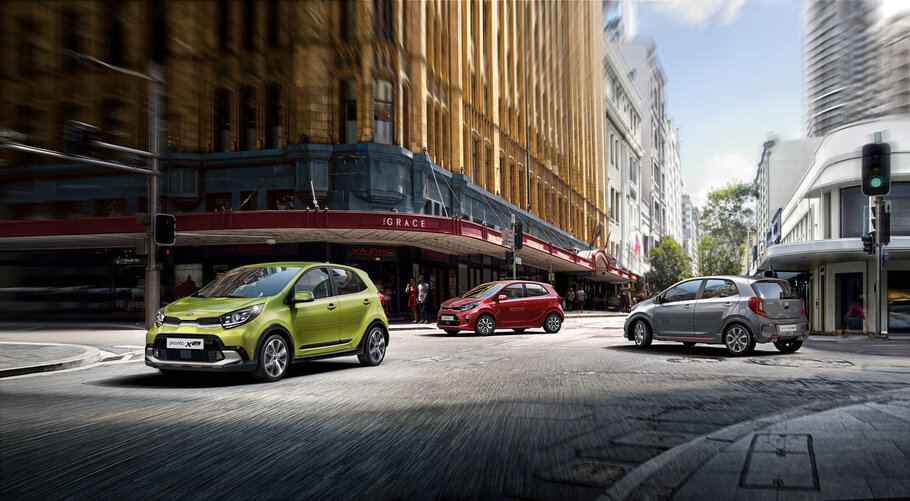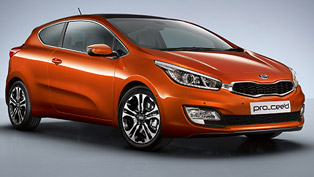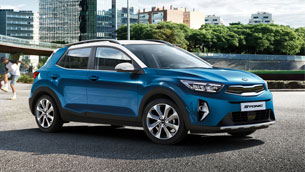UK line up confirmed for revised KIA Picanto and Rio
Kia is cutting a dash this autumn, with updates to its small car collection. On sale from today, the Picanto and Rio both adopt a series of changes to the interior and exterior. Key highlights include the introduction of a new Automated Manual Transmission and ‘Smartstream' powertrains on the Picanto and a 48-volt mild hybrid ‘Eco-Dynamics+' drivetrain for the Rio. That's alongside engine enhancements, revisions to the model line-up, upgrades to technology, the addition of extra equipment, and the latest safety systems.
Picanto: More distinctive with ‘class-above' technology The smallest model in Kia's line-up has been substantially upgraded with a new range of safety systems and telematics technologies that you'll normally see on more expensive models. The revised Picanto features lower CO2 emissions from its new ‘Smartstream' powerplants and adopts bold styling updates, both inside and out.
The upgraded Picanto brings with it a suite of advanced safety technology from Kia's larger cars, making it among the safest cars in its class. It also offers Kia's new ‘Phase II' UVO Connect telematics technologies, enhancing vehicle connectivity, with a new 8-inch touchscreen display now offered on grade ‘3' models and above.
The ‘face' of both the ‘GT-Line' and ‘X-Line' Picanto models has been revised to give each car a more purposeful design. This starts with the ‘tiger-nose' grille, which features a new textured surround and open-link appearance. The chrome-effect surround forms a sweeping shape that extends into the lower part of the headlights and gives the car a wider, more planted appearance. Each side of the ‘tiger-nose' features a red highlight on ‘GT-Line' models or more technical black trim on ‘X-Line' models to resemble air intakes.
Both versions of the car now feature redesigned headlights and four-bulb LED daytime running lights. At the rear, the car also features a new LED rear combination lamp design and a slimmer fog light design, creating a more recognizable rear light signature at the same time.
Each of the ‘GT-Line' and ‘X-Line' models features refreshed front and rear bumper designs with sharper creases in the bodywork for a more contemporary appearance. The changes create a more rugged, robust-looking design for ‘X-Line' models and, for ‘GT-Line' models, an appearance which visually links the car to higher-performance ‘GT' models in Kia's model range. The larger, wider air intake in the lower bumper is accented by the ‘GT-Line' body-colored bumpers with gloss black highlights and jewel-like fog lamps. ‘X-Line' models echo the appearance of SUV protective skid plates, with metal-effect trim bearing the ‘X-Line' logo, and a gloss black surround which extends from the front grille into the wheel arch surrounds at the side of the car.
The upgraded Picanto offers a choice of eight vibrant paint finishes, designed to make the car stand out. A new alloy wheel design for grade ‘2' strengthens the Picanto's sporty character and is a 16-spoke, 14-inch design.
UVO Connect ‘Phase II' telematics with new 8-inch touchscreen The Picanto features a larger 8-inch ‘floating' touchscreen navigation system, replacing the earlier 7-inch system. It also features Bluetooth multi-connection, enabling users to pair up to two mobile devices at the same time – one for hands-free phone and media use, the other for media use only. The system features Apple CarPlayTM and Android AutoTM as standard.
Offering Kia's UVO system, the Picanto gives drivers access to live traffic information, weather forecasts, points of interest, fuel prices, and details of potential on- and off-street parking – including price, location, and availability. The UVO App, compatible with Android and Apple smartphones, enables owners to activate a range of functions and features remotely. Users can remotely send route directions to their car before a journey; check the location of their vehicle, and access vehicle reports and diagnostic notifications.
New ‘Smartstream' petrol engines The latest Picanto is available with two new ‘Smartstream' petrol engines, each maximizing efficiency and lowering CO2 emissions compared to their predecessors. The engine line-up features a 1.0-liter T-GDi (Turbocharged Gasoline Direct injection) engine producing 99bhp, or a 1.0-liter DPi (Dual-Port fuel injection) engine producing 66bhp.
A five-speed manual gearbox is standard on all of the engine choices, with a five-speed automated manual transmission (AMT) available on all grades, except ‘1'.
Automated Manual Transmission (AMT) The updated Picanto is the first model equipped with Kia's new Automated Manual Transmission (AMT). The AMT is based around a five-speed manual transmission with clutch and gear shift actuators to automate clutch operation and gear shifts. Using a single dry clutch, the AMT is a cost-effective option for customers who favor the convenience and ease-of-use of an automatic transmission, without sacrificing the fuel efficiency of a conventional manual transmission.
New Advanced Driver Assistance (ADAS) Systems Several of Kia's latest Advanced Driver Assistance Systems (ADAS) and a range of new active safety systems to enhance occupant safety, make the Picanto one of the safest cars in its class.
Standard from specification ‘2' and upwards, the Picanto's Advanced Driver Assistance Systems includes Forward Collision-Avoidance Assist (FCA) with a vehicle and pedestrian detection. The updated Picanto is also equipped with Kia's Vehicle Stability Management (VSM), Torque Vectoring by Braking, Cornering Brake Control (CBC), and Straight-line Stability (SLS) systems as standard, helping drivers maintain control under braking and cornering. The updated Picanto is now fitted with seven airbags as standard throughout the cabin, including a driver's knee airbag. It also features an ISOFIX child-seat tether and anchor points.
Rio: Updated design, mild-hybrid technology, and new connectivity A range of enhancements has been revealed for the Rio this autumn, with mild hybrid technology the headline act, alongside new ‘Smartstream' engines and a ‘clutch-by-wire' intelligent manual transmission designed to enhance efficiency.
The revised Rio introduces updated exterior and interior styling, alongside new safety equipment, Kia's brand new ‘Phase II' UVO Connect infotainment system, and a new larger 8-inch touchscreen.
Changes to the exterior styling include a narrower ‘tiger-nose' grille, with a lower, wider front bumper and bolder fog light surround. A new 16-inch eight-spoke alloy wheel design is introduced for grade ‘3' models and two new colors are introduced – Storm Grey and Azure Blue – bringing the color palette choices to seven.
Inside, the Rio brings together a range of visual, material, and technological updates to create a more upscale and enhanced quality ambiance. The biggest change is the introduction of a new larger 8-inch touchscreen on grade ‘2' models and above and a higher-resolution color 4.2-inch supervision cluster display.
‘EcoDynamics+' petrol mild hybrid with new intelligent Manual Transmission The Rio is the first Kia powered by a petrol mild-hybrid electric vehicle (MHEV) powertrain. The new ‘EcoDynamics+' powertrain pairs Kia's new ‘Smartstream' 1.0-litre T-GDi (Turbocharged Gasoline Direct injection) engine with Kia's 48-volt MHEV system, maximizing fuel efficiency with electric torque assistance and regenerative braking.
‘EcoDynamics+' has been engineered to deliver greater efficiency from internal combustion engines on the road, seamlessly deploying and recuperating electric power. The system supplements the engine's torque output with power from a compact 48-volt lithium-ion polymer battery and extends the engine ‘off time' with a new Mild-Hybrid Starter-Generator (MHSG) unit.
The MHSG is connected by a belt to the engine's crankshaft and switches seamlessly between ‘motor' and ‘generator' modes. In ‘motor' mode, under acceleration, the MHSG provides electric power assistance to reduce engine load and emissions. As the car decelerates, the MHSG has the ability under certain conditions to switch to ‘generator' mode, recuperating energy from the crankshaft to recharge the battery.
The new ‘EcoDynamics+' powertrain reduces Rio's CO2 emissions and is offered on the 118bhp versions of the new engine. 48-volt powertrains with seven-speed dual-clutch automatic transmission (7DCT) will be equipped with a Drive Mode Select system, giving drivers the choice to customize their drive with ‘Eco', ‘Sport' and ‘Normal' modes.
The Rio ‘EcoDynamics+' is also one of the first models from Kia to be equipped with the brand's new intelligent Manual Transmission (iMT). The ‘clutch-by-wire' system contributes to the MHEV system's greater fuel efficiency and lower CO2 emissions while retaining the driver engagement of a conventional manual transmission. Instead of a mechanical linkage, the iMT's clutch is controlled purely electronically. It integrates seamlessly with the MHSG to switch off the engine earlier than Kia's Idle Stop & Go start-stop system when coasting to a halt, improving overall fuel efficiency.
The 1.25-litre ‘Smartstream' engine There is a further petrol engine in the Rio line-up, a four-cylinder 16-valve unit featuring Dual-Port injection technology. The 1.25-liter unit is from the ‘Smartstream' family of engines and has been redesigned compared to the engine in the previous Rio.
Cutting-edge ‘Phase II' UVO Connect infotainment Offering Kia's UVO system, the Rio is among the first Kia vehicles to offer new ‘Phase II' UVO Connect telematics features. Rio gives drivers access to a range of ‘Phase II' On-Board Services, in addition, to live traffic information, weather forecasts, points of interest (POIs), fuel prices, and details of potential on- and off-street parking – including price, location, and availability. The system also features Online Voice Recognition, supported by server technologies, which lets users give voice commands, hands-free, to search for nearby POIs, addresses, weather updates, or send text messages.
The UVO App, compatible with Android and Apple smartphones, also offers a range of new ‘Phase II' features, enabling owners to activate a range of functions and features remotely. Users can remotely send route directions to their car before a journey, check the location of their vehicle, and access vehicle reports and diagnostic notifications.



















